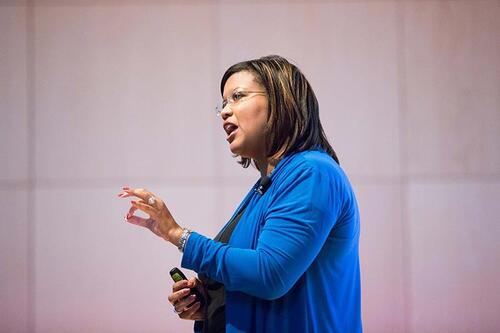
Blending a touch of humor with serious work, Geneseo celebrated the fifth anniversary of ASSESStivus, the college-wide discussion that promotes “assessment for the rest of us.” The name is a nod to the classic 1997 Seinfeld episode when George Costanza revealed his family’s celebration of its own secular holiday called Festivus.
Developed in 2012 by the College Assessment Advisory Committee after the Middle States accreditation visit, ASSESStivus highlights assessment initiatives and information-sharing in support of continuous improvement. This year’s agenda included various workshops and presentations — including campus-wide survey results regarding supporting student mental health and a session on measuring student success at Milne Library and the Center for Academic Excellence.
In addition, Dr. Tia Brown McNair, vice president of the Office of Diversity, Equity and Student Services at the American Association of Colleges and Universities (AAC&U) in Washington, D.C., delivered the keynote address.
McNair drove home the importance of connecting high-impact practices with applied learning outcomes, beginning with a lighthearted video that underscored the need to prepare students to meet the challenges of the future. She also cited that while 85% of campuses surveyed by the AAC&U reported that they have learning outcomes, only 9% agreed that their students understand those outcomes. In light of that disconnect, McNair challenged more than 70 faculty and staff in the audience to embrace a paradigm shift by reorienting the phrase, “college-ready student” to “student-ready” college.
According to McNair, such a shift requires more than a culture of leadership. It demands an intentionality of curriculum design that incorporates high-impact practices to prepare students for the “unscripted problems and challenges that they will face in life, work, and citizenship in the United States and global communities.” To illustrate, she discussed the emergence of e-portfolios and their growing preference among employers as a way to summarize and demonstrate students’ accomplishments in key areas versus the traditional college transcript.
“Dr. McNair’s presentation reinforced our own campus discussions about the need for applied and integrative learning as a fundamental outcome of a Geneseo education for all students,” said ASSESStivus Coordinator David Parfitt, director of the Teaching and Learning Center and the Institute for Community Well-being.
Among the presentations, Interim Associate Provost Ken Kallio spoke about Geneseo’s recent cluster hiring initiatives in statistics and Latin American Studies, describing the practice as an institutional development strategy. “Cluster hiring allows us to build pockets of excellence by hiring faculty across disciplines who share a common interest,” he noted. “It allows us to build capacity for interdisciplinary programs and increase our agility to meet student needs.”
As evidence of that, Michael Restivo, assistant professor of sociology and Yusuf Bilgic, assistant professor of mathematics, shared reflections of their first year teaching Advanced Statistics across the curriculum (with Christine Merrilees, assistant professor of psychology who had a previous commitment).
As part of the Statistical Analysis Learning Community, the class enrolled 28 students — 14 majoring in psychology; nine in sociology and five in math (double majors included). All students presented their research during GREAT Day as part of six teams and one presented at the UP-STAT conference, which brings together the upstate chapters of the American Statistical Association.
According to Restivo, the challenge of having three different professors, each with unique teaching styles, was evident, but he felt that they collaborated well. “We were like students ourselves, getting familiar with each other’s styles, and I believe it will only improve as we teach the class more often,” he said.
Among the lessons learned? “Geneseo students are good learners, and all had proficiency in some, but not all, areas of statistical research. Teach without making assumptions about what they do or don’t already know.”
Similarly, Rose McEwen, associate professor of languages and literature and coordinator of the Latin American (L.A.) Studies program, and Jennifer Guzmán, assistant professor of anthropology, shared an overview of how cluster hiring with its multi-disciplinary approach has enhanced the L.A. Studies minor.
Given the rapidly growing Latin American population in the United States, Geneseo students enrolled in this program gain an excellent foundation for careers in public service, business, humanitarian work, law and health care. In addition, they are able to interact with diverse populations and understand their cultures, backgrounds and languages.
“Our students’ employability is enhanced when they combine an L.A. minor with another major or minor,” said McEwen. “They can offer discipline-specific skills with a high degree of language and cultural competency gained through service learning and involvement with student organizations and clubs.”
The Latin American Studies cluster includes Guzmán and faculty members Ryan Jones (History), Melanie Medeiros (Anthropology); Kyle Matthews (Languages and Literature) and Karleen West (Political Science and International Relations).
Planning is now underway for next year’s ASSESStivus, scheduled for early September. For more information, contact David Parfitt at parfittd@geneseo.edu.
Story by Tony Hoppa, Executive Director of Academic Communications